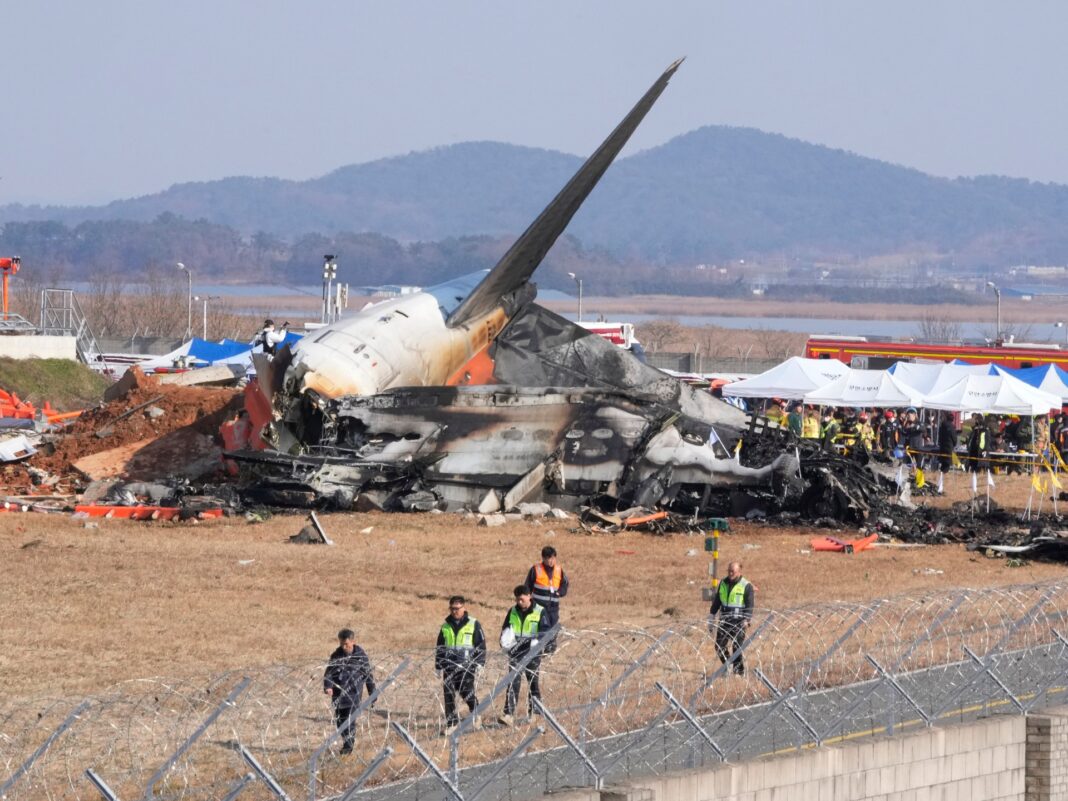South Korea is in a state of mourning after a plane crash killed 179 people in what is now being called one of the country’s worst aviation disasters. Only two people survived the accident.
Authorities are still scrambling to pinpoint the exact reason why the aircraft – Jeju Air Flight 2216 from Thailand to South Korea – malfunctioned while landing on Sunday, leading it to crash into a concrete barrier and go up in flames.
Officials said they are painstakingly identifying victims’ bodies, which were extensively damaged in the crash. Some families are angry, however, and blame the authorities for being too slow to release the bodies of their loved ones.
Sunday’s disaster comes days after an Azerbaijan Airlines flight crashed in the Kazakh city of Aktau on Wednesday, killing 38 people and injuring 29. The flight was on its way to Grozny in Russia’s Chechnya region.
South Korean authorities have declared seven days of national mourning. Acting President Choi Sang-mok has also ordered an extensive probe into the crash and an emergency check of the country’s entire airline safety system.
On Monday, another Jeju Air flight from Seoul to Jeju Island returned to base after identifying a mechanical issue affecting its landing gear.
Here’s what to know about Sunday’s disaster:
When and where did the plane crash?
The Boeing 737-800 jet crashed in the town of Muan at 9:03am (00:03 GMT) on Sunday. The town is about 290km (180 miles) south of Seoul, and the flight had flown from Bangkok, Thailand.
Video footage showed how the plane sped across the airstrip, overshot the runway and crashed into a concrete barrier before erupting into a fireball. Plumes of black smoke billowed from the wreckage.
The aircraft had done a belly landing, meaning the plane’s landing gear was not deployed. A plane’s retractable wheels provide the main support for an aircraft when it is taxiing, taking off, landing or is stationary.
Officials said nearly all of the plane was destroyed in the explosion. Only its tail was recognisable, and that’s where the two survivors were pulled from.
Who was on board the plane?
A total of 181 people were on the flight, including six crew members, according to South Korean authorities.
Of those, 179 people died in the crash while two crew members who were in the tail section survived. The man and woman were taken to hospital. The man is currently able to communicate fully, according to local media reports.
Most of the passengers were South Korean nationals and were returning from holidaying in Thailand. The oldest person was 78, and the youngest was three years old, according to the flight manifest. One family lost nine members in the crash.
Two of the victims – identified as Jongluk Doungmanee, 45, and Sirithon Chaue, 22 – were Thai officials, according to the government of Thailand.

Have all the bodies been identified?
Not all the bodies have been identified because many were badly damaged. Joo Jong-wan, the aviation policy director at the Ministry of Land, Infrastructure and Transport, said 141 bodies had been identified by Monday.
Only five bodies were released on Monday. Grieving and angry relatives have been waiting at the airport since Sunday. Some relatives have complained that the identification process is taking too long.
Officials told families they are taking their time so mistakes with the identification and release process are not made. A local police officer said the five bodies released were the only ones still intact. There will be more identifications on Tuesday morning, he told reporters.
Families camped out in green emergency tents set up in the airport’s departure hall to provide privacy to the grieving relatives.
Why did the plane crash? Was it a bird strike?
It’s still not clear exactly what caused the failed landing, and experts said the crash is perplexing because the plane did not appear to have any issues.
Government investigators have retrieved the flight data and cockpit voice recorders, which will help them determine the cause of the crash and the ensuing fire. However, it could take several weeks to get the results.
Authorities are exploring if the aircraft had been struck by birds and if that had led to an engine failure and the problem with the wheels.
Officials said the airport control tower had issued a bird strike warning to the plane shortly before its pilot signalled the intentions to land and received permission to land in a different area. However, before the plane landed, the pilot issued a mayday and reported a bird strike to air controllers.
The plane landed unusually, aside from the absent landing gear, experts said. It hit the runway two-thirds of the way down, meaning it still had way too much speed and too little room to slow down, leading it to hit the concrete barrier at the end of the strip.
Bird strikes are common occurrences in aviation. A plane could fly through a flock of birds and ingest a bird into its engine, causing system failures. However, those accidents are rarely fatal for humans.
Some experts said it was unlikely that a bird strike was the sole factor leading to the crash because plane manufacturers factor that into the design of modern planes. Those controls mean that when a fault such as a failed engine or failed landing gear occurs, there are other systems that kick into place to support the aircraft.

What is Jeju Air? And who manufactured the airplane?
Named after Jeju Island, the airline is the first and largest of South Korea’s budget carriers. It began operations in 2005 as a joint public-private partnership between the Aekyung Group and the government of Jeju province. Its headquarters and largest airport base is in Jeju City.
On Sunday, Jeju Air bosses bowed deeply and issued a public apology at a news conference.
“We deeply apologise to all those affected by the incident. We will make every effort to resolve the situation,” the company said in a statement.
The airline has only recorded one other air accident: In 2007, a Dash 8-400 aircraft overshot the runway at Busan’s Gimhae International Airport. All 79 people on board survived although four passengers were injured.
Two Jeju Air flights were flagged by the Transport Ministry in March 2022 for failing to follow safety protocols. The flights were grounded for seven to 20 days.
The plane that crashed on Sunday was manufactured by Boeing. The Boeing 737-800 was 15 years old. Standard aircraft are usually 10 to 20 years old, according to aviation experts.
Boeing has come under fire in recent years for another class of aircraft, the Boeing 737 MAX, which was linked to fatal crashes in 2018 and 2019 that killed 346 people. This year, the aircraft suffered several incidents, including a cabin door that blew out midair on an Alaskan Airlines flight in January.
After Sunday’s crash, Boeing said it stood “ready to support” Jeju Air and it was in touch with the airline.
Has South Korea had any other major airplane accidents?
Yes. On August 6, 1997, Korea Air Flight 801 from Seoul crashed into the mountains in Guam as it approached an airport, killing 229 of 254 people on board. The aircraft was a 12-year-old Boeing 747-300, and the crash occurred due to several reasons, including reduced visibility from heavy rains, pilot fatigue and inadequate flight crew training.
In another incident in 1989, a Korea Air flight from Seoul to Tripoli crashed while landing. The plane overshot the runway and struck houses and cars as it taxied off course. In all, 75 passengers and four people outside the plane were killed.

What’s the latest on the ground?
Hundreds of firefighters and security officials are swarming the crash site, digging through debris to gather DNA and other evidence.
Authorities on Monday began an emergency “comprehensive inspection” of all Boeing 737-800 aircraft operated by all airlines in the country. Aviation official Joo Jang-wan told reporters there are 101 of those aircraft operated by six carriers and all will be “thoroughly” inspected.
Family members are also providing their saliva and other DNA samples to help officials identify the deceased. They said they want officials to move faster and deliver the bodies of their loved ones.
“We want [the government] to recover our families 100 percent or at least 80 percent as soon as possible,” Park Han-shin, whose brother died in the crash and who is a spokesman for the families, told reporters on Monday.
He added that families are also demanding compensation from Jeju Air. “The only way for bereaved families to feel that [Jeju Air] has done everything it can is to help bereaved families financially. Parents of a family have passed away. There are only kids left, and how can they live on their own? This is something neither the provincial officials nor the government can help with,” he said.
The crash happened at a tumultuous political time in South Korea. It was triggered by President Yoon Suk-yeol’s imposition of martial law, leading to his impeachment. Acting President Han Duck-soo was also impeached this week.
Many in the country are worried about how a leadership vacuum could affect the investigations. Acting President Choi was at the crash site on Monday and urged officials to use all available resources to identify the missing.


